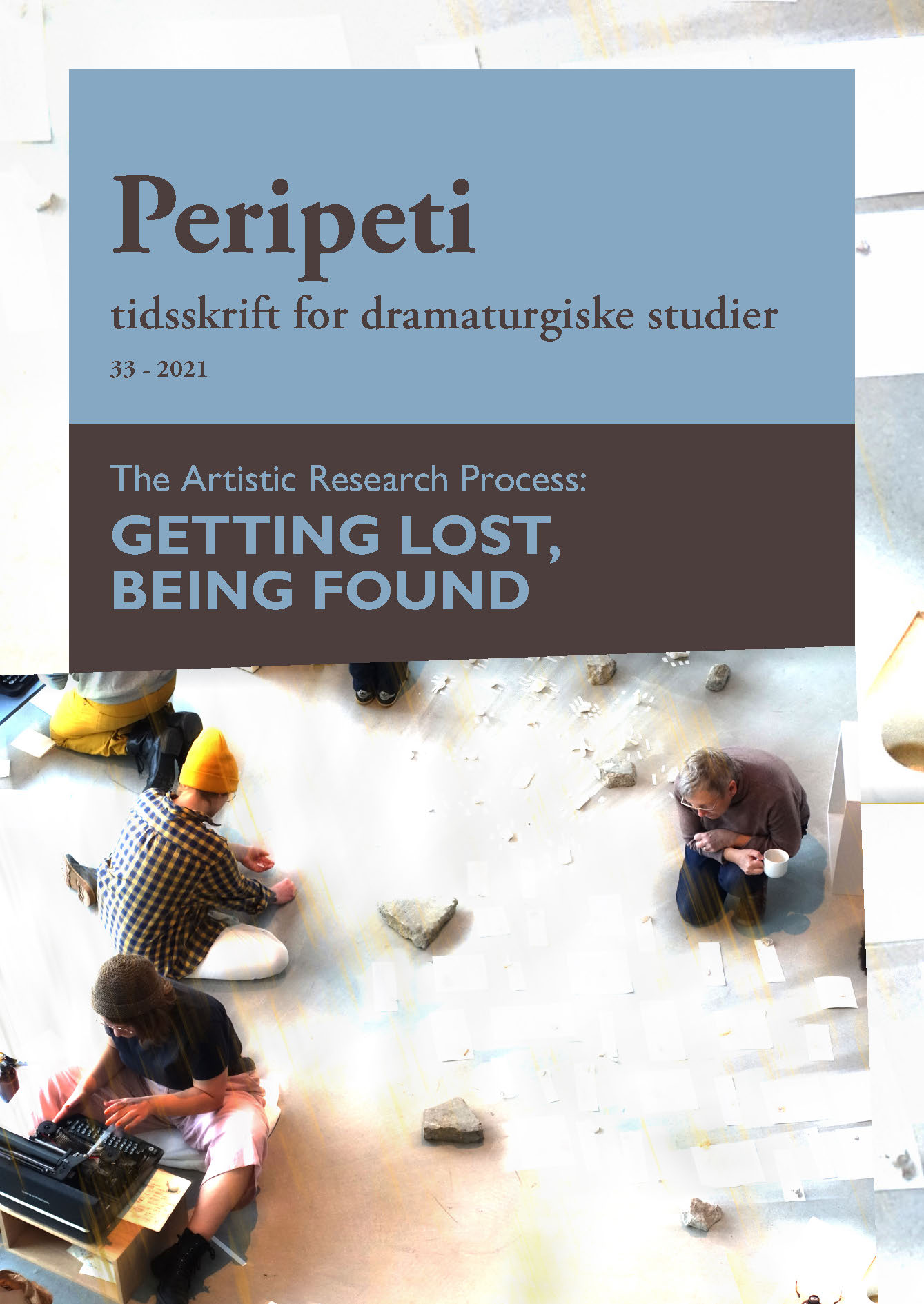From artist to artist-researcher *
Adventuring into practice-driven research
DOI:
https://doi.org/10.7146/peri.v18i33.124623Resumé
Presenting a personal account of some of the methodological considerations connected to making the shift from artist to artist researcher, this article asks: how does one create favourable conditions for valid moments of insight to occur in a practice that focuses on participatory choreographic practices involving children and young people? The article unpacks the tangled relationship between ‘practice’ and ‘research,’ and the author proposes the term practice-driven research to suggest an approach where the artistic practice is both the object, the method and the outcome of the research. Drawing parallels to decolonisation practices, the article highlights the importance of shared (re-)naming of central concepts. It is suggested that choreographic strategies that are less concerned with movement language, relying instead on expressive concepts and operating within the field of expanded choreography, may allow the participants to skip the translation of (culturally dependent) movement language and move more readily into a shared, open-ended artistic investigation.Disruption of current prevalent practice within both the social and the artistic field is identified as necessary in order to achieve success in works that span pedagogy, participation and performance (Bishop, 2012), and a practical example of such a disruption strategy based on the KUV project ‘It wont be the same here when it is no longer now’ (2017) is provided.
Referencer
Arlander, Annette, 2017. Artistic Research as Speculative Practice [Online]. Available: http://jar-online.net/artistic-research-as-speculative-practice/ [Accessed 6 June 2018].
Bishop, Claire, 2012. Artificial Hells: Participatory Art and the Politics of Spectatorship. London, Verso.
Candy, Linda, 2006. Practice Based Research: A Guide. Sydney, University of Technology.
Cvejić, Bojana, 2015. Choreographing Problems: Expressive Concepts in Contemporary Dance and Performance. London, Palgrave Macmillan.
Massey, Doreen, 2005. For Space. London, Sage Publications Ltd.
Navndrup Black, Laura & Macedo, Deborah, (forthcoming). Creating other possible futures: narratives of an intercultural dance encounter.
Nelson, Robin, 2013. Practice as Research in the Arts: Principles, Protocols, Pedagogies, Resistances. Palgrave Macmillan UK.
Rogoff, Irit, 2007. Academy as Potentiality. Zehar. Donostia: Artekelu, 60/61, 4-9.
Topolinski, Sascha & Reber, Rolf, 2010. “Gaining Insight Into the ‘Aha’ Experience”. Current Directions in Psychological Science, 19, 402-405.
Tuhiwai Smith, Linda, 2012. Decolonizing Methodologies: Research and Indigenous Peoples. London, Zed Books Ltd.
Downloads
Publiceret
Citation/Eksport
Nummer
Sektion
Licens
Det følgende vedrører alle Peripeti-udgivelser fra 2024, nr. 39, og senere:
Peripeti er et Diamond Open Access-tidsskrift, der giver direkte open acces til publiceret indhold ud fra princippet om, at det at gøre forskning frit tilgængelig for offentligheden understøtter en større global udveksling af viden.
Forfattere skal ikke betale for indsendelse, redigering eller offentliggørelse af artikler.
Forfattere, der bidrager til Peripeti, bevarer ophavsretten til deres artikler.
Forfattere accepterer at udgive artikler under en Creative Commons CC-BY-NC 4.0-licens. Vilkårene for denne licens tillader brugere frit at kopiere og videredistribuere materialet i ethvert medie eller format og at tilpasse, transformere og bygge videre på materialet, så længe der gives passende kreditering, et link til licensen gives, og eventuelle ændringer angives. Brugere må ikke dele eller tilpasse materialet til kommercielle formål uden samtykke fra licensgiveren. Brugen af licensen må ikke på nogen måde antyde, at licensgiveren støtter tredjeparten eller dennes brug. Licensen kan ikke tilbagekaldes.
Forfattere opfordres til at lægge deres artikler ud på personlige og/eller institutionelle hjemmesider for at sikre endnu større offentlig adgang efter udgivelsen. Forfattere har ret til at arkivere deres artikler i fondes og offentlige institutioners arkiver, men Peripeti anmoder om, at forfattere bruger et direkte link til den publicerede artikel på tidsskriftets hjemmeside, når det er muligt, da Peripeti som en ikke-kommerciel, offentligt finansieret udgiver er afhængig af niveauet af brugeraktivitet på tidsskriftets hjemmeside.
Vedrørende tidligere udgivelser, indtil 2024, herunder nr. 38:
Ophavsretten deles mellem Peripeti og forfatteren/forfatterne. Tidsskriftet er et open access-tidsskrift, der giver direkte adgang til alt indhold baseret på princippet om, at det at gøre forskning frit tilgængelig for offentligheden understøtter en større global udveksling af viden. Brugere kan frit kopiere og dele materiale i ethvert medie eller format, så længe der gives passende kreditering. Enhver anden brug kræver skriftligt samtykke fra indehaverne af ophavsretten.





